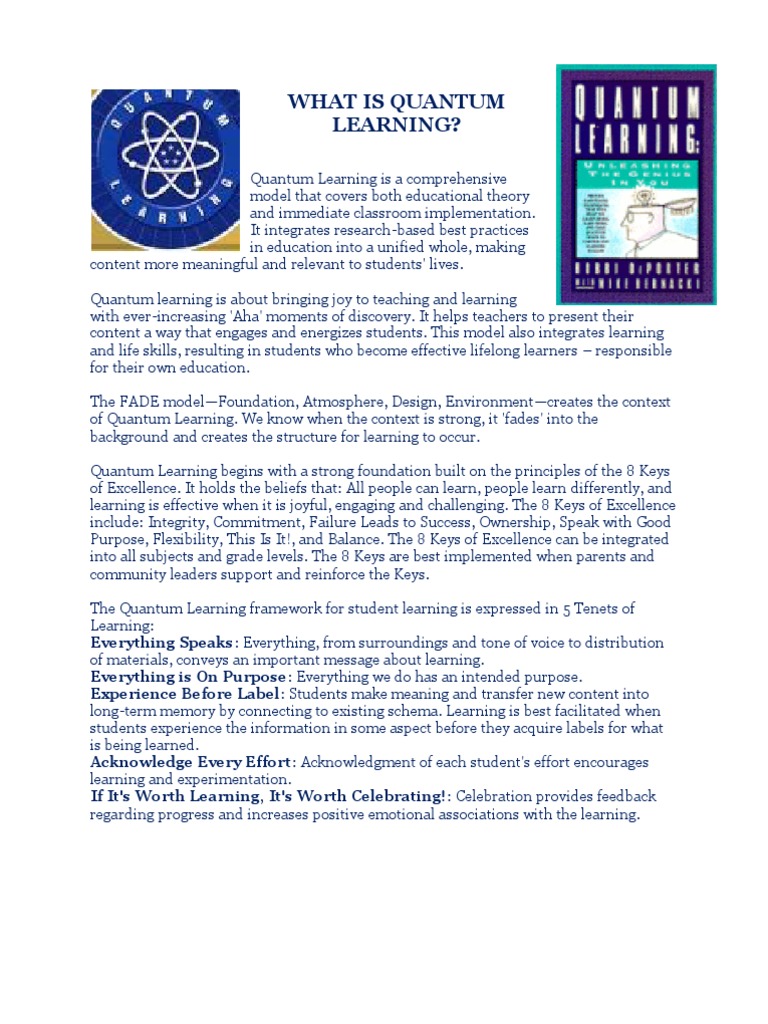In recent years, the field of quantum computing has captivated researchers, technologists, and enthusiasts alike. Its potential to revolutionize processing capabilities has engendered a pervasive curiosity, propelling inquiries about what it entails and, importantly, what is required for one to embark upon this intellectual journey. This article delineates the prerequisites for learning quantum computing, addressing the foundational knowledge necessary, the critical mentality required, and the skills that will facilitate mastery of this complex subject.
1. Mathematical Foundations
At its core, quantum computing is an extension of classical computing principles, refracted through the lens of quantum mechanics. Therefore, a robust understanding of mathematics is indispensable. Topics such as linear algebra, calculus, and discrete mathematics emerge as crucial constituents. Linear algebra, in particular, reveals its significance through the manipulation of quantum states, which can be represented as vectors in a high-dimensional space. Familiarity with concepts like eigenvalues and eigenvectors will pave the way for comprehending quantum gates and measurements.
Calculus enters the discussion via quantum algorithms, encompassing derivatives and integrals critical to understanding continuous transformations. Discrete mathematics is equally vital, particularly with respect to combinatorial analysis and graph theory, which often arise in algorithmic design. Collectively, these mathematical domains equip the learner with a toolkit for traversing the intricacies of quantum circuits and algorithm specifications.
2. Classical Computing Knowledge
To appreciate the unique capabilities of quantum computers, one must first possess a solid understanding of classical computing paradigms. This includes familiarity with algorithms, data structures, and complexity theory. Grasping the limitations of classical systems provides a critical framework against which the advantages of quantum computing can be comprehensively understood. Quantum computation leverages principles such as superposition and entanglement to solve problems considered intractable for classical systems.
Furthermore, knowledge of programming languages—particularly those pertinent to quantum computing, such as Qiskit or Cirq—is beneficial. Engaging with classical coding environments is a precursor that facilitates the transition to quantum programming, as the principles of logical thinking and problem-solving remain consistent across platforms. Learners should cultivate proficiency in at least one classical object-oriented language (e.g., Python or Java) to enhance their programming literacy, laying a solid foundation upon which to build quantum-specific skills.
3. Understanding of Quantum Mechanics
Perhaps the most daunting prerequisite is a foundational comprehension of quantum mechanics. This scientific discipline delineates the behavior of matter and energy at the smallest scales and is replete with phenomena that challenge classical intuition. Concepts such as wave-particle duality, uncertainty principles, and quantum superposition serve as cornerstones for any aspiring quantum computing practitioner.
A deep dive into quantum mechanics might seem formidable, yet its principles underpin the operation of quantum systems. Educational resources range from introductory courses on quantum physics to more advanced texts exploring quantum theory and its mathematical foundations. Engaging with these resources will cultivate the learner’s ability to navigate the abstract yet fascinating landscape of quantum phenomena.
4. Problem-Solving and Abstract Thinking Skills
The realm of quantum computing is inherently abstract, requiring a facility for problem-solving and critical thinking. Learners must grapple with non-intuitive concepts, such as qubits’ states and their representation within Hilbert spaces, which diverges significantly from classical models of computation. Developing an ability to think abstractly equips learners to conceptualize complex algorithms and envision quantum architectures effectively.
Engaging with puzzles and challenges that require unconventional problem-solving approaches can hone these skills. Additionally, collaborative study environments or coding competitions can inspire innovative thinking, facilitating the application and reinforcement of newly acquired knowledge.
5. Persistence and Curiosity
A significant impediment to mastering quantum computing is not merely the technical expertise required but also the persistence to navigate through challenges. Quantum computing is a rapidly evolving field, often characterized by steep learning curves and ongoing research. Thus, maintaining a sense of curiosity and a willingness to explore new paradigms is essential.
Encouragement to pursue continuous learning can be derived from various sources, ranging from academic symposiums to online forums where enthusiasts exchange ideas and insights. Delving into quantum computing literature and staying abreast of innovations within the field will also fortify one’s intellectual resilience, enabling learners to adapt to the pace of advancements.
6. Interdisciplinary Knowledge
Quantum computing does not exist in a vacuum; its implications reverberate across various disciplines, including cryptography, materials science, and machine learning. An interdisciplinary approach enriches the understanding of quantum technologies. For instance, knowledge of cryptographic principles provides insight into the security implications of quantum algorithms, while familiarity with statistical methods enhances the grasp of data analysis in quantum contexts.
The synthesis of ideas across disciplines can inspire innovations and applications that leverage quantum computing’s unique capabilities. Engage with fields that resonate with your interests; this will not only bolster your comprehension of quantum concepts but also entice you to contribute novel perspectives.
Conclusion
Embarking on the journey to learn quantum computing necessitates a multifaceted foundation. From grasping mathematical theories and classical computing principles to developing an understanding of quantum mechanics, adopting a problem-solving mindset, and maintaining interdisciplinary curiosity, the prerequisites collectively address a wide spectrum of intellect and skill. As the fascination with quantum computing continues to burgeon, those who prepare themselves with these capabilities will undoubtedly find themselves at the forefront of a technological revolution with profound implications for myriad domains.












